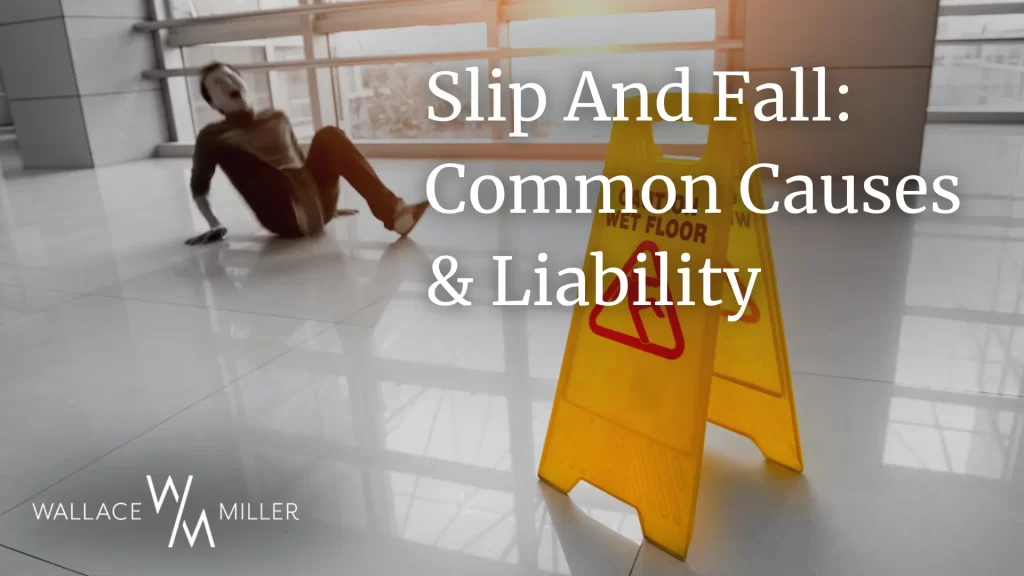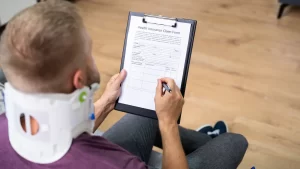Posted on Saturday, January 13th, 2024 at 4:43 pm

Slip and fall accidents are among the most common types of personal injury cases in Chicago. These incidents can occur anywhere, from grocery stores and restaurants to sidewalks and private residences. When a slip and fall accident happens due to a property owner’s negligence, the victim may be entitled to compensation for their injuries and related expenses.
Understanding the common causes of slip and fall accidents and the legal concept of liability is essential for protecting your rights and seeking the compensation you deserve.
Common Causes of Slip and Fall Accidents
Several factors can contribute to slip and fall accidents. Some of the most common causes include:
- Wet or slippery surfaces: Spills, leaks, or recently mopped floors can create hazardous conditions that lead to slips and falls.
- Uneven or damaged flooring: Cracked sidewalks, loose floorboards, or torn carpeting can cause people to trip and fall.
- Inadequate lighting: Poor lighting in stairwells, hallways, or outdoor areas can make it difficult for people to see potential hazards, increasing the risk of falls.
- Lack of handrails or guardrails: Stairways or elevated platforms without proper handrails or guardrails can contribute to serious fall accidents.
- Cluttered walkways: Obstructed paths or walkways cluttered with debris can create tripping hazards.
- Weather-related conditions: Ice, snow, or rain can make surfaces slippery and treacherous, particularly when property owners fail to take appropriate measures to mitigate these risks.
When a property owner fails to address these hazards or warn visitors of their presence, they may be held liable for any resulting injuries.
Slip and Fall Liability
In Illinois, property owners have a legal duty to maintain their premises in a reasonably safe condition. This obligation extends to identifying and repairing potential hazards or providing adequate warnings to visitors. When a property owner breaches this duty, and someone is injured as a result, the owner may be held liable under the legal theory of negligence.
To establish liability in a slip and fall case, the injured party must generally prove the following elements:
- The property owner owed a duty of care to the victim.
- The property owner breached that duty by failing to maintain safe premises or warn of potential hazards.
- The breach of duty directly caused the victim’s injuries.
- The victim suffered actual damages, such as medical expenses, lost wages, or pain and suffering, as a result of the incident.
It’s important to note that the specific rules and requirements for proving liability may vary depending on the circumstances of the case and the relationship between the property owner and the victim.
Proving Negligence in Slip and Fall Cases
To succeed in a slip and fall claim, you must gather evidence to support your case and demonstrate the property owner’s negligence. Some key steps in proving negligence include:
- Documenting the scene: Take photographs of the hazardous condition that caused your fall, as well as any visible injuries you sustained.
- Obtaining witness statements: If anyone saw your accident, get their contact information and ask them to provide a written statement detailing what they observed.
- Reporting the incident: Notify the property owner or manager of your accident and request that they create an official incident report.
- Preserving evidence: Keep the clothing and shoes you were wearing at the time of the accident, as they may provide valuable evidence of the hazardous condition.
- Seeking medical attention: Get a prompt medical evaluation of your injuries and follow your doctor’s treatment plan. This step is crucial for both your health and your legal claim.
- Consulting with an attorney: An experienced slip and fall attorney can help you navigate the legal process, gather evidence, and build a strong case on your behalf.
Legal Process for Slip and Fall Claims
 If you’ve been injured in a slip and fall accident in Chicago, it’s essential to understand the legal process for seeking compensation. The steps typically involve:
If you’ve been injured in a slip and fall accident in Chicago, it’s essential to understand the legal process for seeking compensation. The steps typically involve:
- Filing an insurance claim: If the property owner has liability insurance, you may start by filing a claim with their insurance company.
- Negotiating a settlement: Your attorney will work to negotiate a fair settlement with the insurance company, seeking compensation for your medical bills, lost wages, pain and suffering, and other damages.
- Filing a lawsuit: If a satisfactory settlement cannot be reached, your attorney may recommend filing a personal injury lawsuit against the property owner.
- Proceeding with litigation: The litigation process may involve discovery, depositions, and potentially a trial, where your attorney will present evidence and argue your case before a judge or jury.
Throughout this process, your attorney will provide guidance, support, and representation to help you pursue the compensation you deserve.
Contact a Slip and Fall Attorney Today
Slip and fall accidents can result in serious injuries and significant financial burdens. If you’ve been hurt due to a property owner’s negligence, it’s crucial to understand your legal rights and options for seeking compensation.
The dedicated personal injury attorneys at Wallace Miller have extensive experience handling slip and fall cases in Chicago. Contact us at (312) 261-6193 to schedule a free consultation and learn how we can help you navigate the legal process and fight for the justice you deserve.
